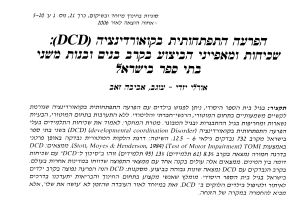הפרסומים המדעיים והספרים של ד"ר אורלי יזדי-עוגב
רשימת הפרסומים והספרים שכתבתי לאורך השנים

פרסומים מדעיים
יזדי-עוגב, אורלי (2025). בנושא: קומורבידיות של הפרעה תפתחותית בקואורדינציה (DCD) והפרעת קשב והיפראקטיביות ( (ADHD בילדות: שכיחות גורמי סיכון התפתחותיים ומוטוריים בשנת החיים הראשונה. התקבל לפרסום בכתב העת 'מעיינות'.
Zach, S., & Yazdi-Ugav, O. (2021). Conceptual Model for Explaining Academic
Achievements and Social Functioning of Students with and without Learning
Disorders. Sustainability, 13(5), 2559.
Abstract: The purpose of the study was to develop a comprehensive model that examines whether motor abilities and socioemotional adjustment contribute to the academic achievement and social functioning of students. Participants were 733 children, aged 6.04–13.72 years. Among them, 642 were typically achieving children, and 91 were children with learning disorders (LD). Measurements were: Children’s Sense of Coherence Scale, Children’s feelings of loneliness and social dissatisfaction, The Social Skills Rating System, and The Test of Motor Impairment–Henderson Revision. Results showed that LD explains all dependent variables in the model. According to this model, there is a valid reason for the controversy that still exists between policy makers who focus on academic achievement and early childhood educators who emphasize social skills and behavior
Yazdi-Ugav, O., Zach, S., & Zeev, A. (2020). Socioemotional Characteristics of
Children With and Without Learning Disabilities. Learning Disability Quarterly,
0731948720938661.
Abstract
The purpose of the study was to characterize the relationships between behaviour problems, academic achievement, and loneliness of students in the upper and lower thirds of a social skills classification. Participants were 733 students (359 boys and 374 girls) aged 9 to 14 years, 642 without learning disabilities (LDs) and 91 with LDs. Their homeroom teacher rated their social skills, and accordingly the upper and lower thirds of social skills scores were determined. Results showed differences in behaviour problems between the low and high social skills groups. Boys displayed higher rates of behaviour problems. Students with LDs achieved lower scores than their peers in academic achievements and higher scores in loneliness. The final model of the binary stepwise logistic regression showed that loneliness, behaviour problems, and academic achievements were related to social skills, explaining 60% of the pseudo-variance (Cox & Snell R2 = .60). The findings help target individual variables that can promote school adjustment.
Zach, S., Yazdi-Ugav, O., & Zeev, A. (2016). Academic achievements, behavioral
problems, and loneliness as predictors of social skills among students with and without learning disorders. School Psychology International, 37(4), 378-396.
Abstract
This study aimed to examine to what extent academic achievements, learning disorders, behavior problems and loneliness explain the variance of students’ social skills. The differ- ences between students diagnosed with learning disorders and students without learning
disorders in all four variables were examined. Participants were 733 elementary students (642 without LD; 91 with LD). Homeroom teachers assessed students’ academic achieve- ments, behavior problems, and social skills. Students completed questionnaires regarding
their loneliness feelings. Regression analysis showed that academic achievement and behav-ior problems explained approximately 70% of the students’ social skills variance, whereas LD did not, and loneliness explained social skills variance only among boys. These unex-
pected but encouraging findings are discussed in terms of the positive process of change that occurred since the announcement of the Israeli National Special Education Law of 1988, which made it possible for students with LD to be integrated in regular classes.
Yazdy-Ugav, O. & Romi, S. (December, 2002). Psychomotor Development
Assessment. In: Fernandez-Ballesteros (Ed.). The Encyclopedia of
Psychological Assessment (2 vols). London: Sage Publications Ltd.
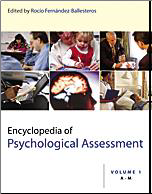
Yazdy-Ugav, O. (1996). Attention deficit disorder (ADD): Definitional Issues, learning disability and social psychomotor characteristics. In: Ephraty, N. & Lidor, R. (1996). The Second International Conference: Teacher Education: Stability, Evolution And Revolution. Book of Abstracts. Israel: Ministry of Education, Culture and Sport. Department of Teacher Education. Mofet Institute, 343-354.
Speed of information processing in sport: Closed vs open skills.
Journal ArticleDatabase: APA PsycInfo
Yazdy-Ugav, Orly
Citation
Yazdy-Ugav, O. (1989). Speed of information processing in sport: Closed vs open skills. International Journal of Sport Psychology, 19(4), 281–295.
Abstract
Compared the speed of information processing, via reaction time (RT) and anticipation time (AT) measures of athletes specializing in closed-skill sports with that of athletes representing open-skill sports. 73 athletes from different sport branches were assigned to the closed-skill or the open-skill group on the basis of the judgment of 10 professionals. Discriminant analysis indicated a significant difference between the closed- and the open-skill groups, supporting the hypothesis that the latency and accuracy of a response is related to the processing load. Specifically, open-skill athletes scored better in RT and AT than did closed-skill athletes. (French, Spanish, German & Italian abstracts) (PsycINFO Database Record (c) 2016 APA, all rights reserved)
מלאו את הטופס למטה ואנו ניצור איתכם קשר בהקדם האפשרי
תעקבו גם ברשתות
ספרים שחוברו על ידי ד"ר אורלי יזדי-עוגב

יזדי-עוגב, א. (1995). התפתחות ולמידה מוטורית תקינה מול לקוייה
מכון וינגייט: הוצאת גיל עמנואל. מס' עמודים: 159.
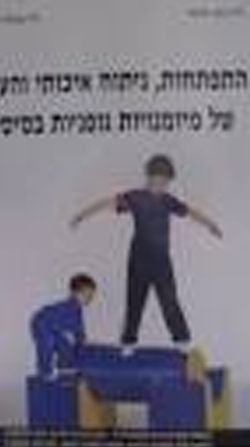
לידור, ר. ויזדי-עוגב, א. (1996). ניתוח איכותי של תנועות גופניות בסיסיות
היבטים תיאורטיים ויישומיים. מכון וינגייט: הוצאת גיל עמנואל. מס' עמודים: 197.
לידור, ר., לויאן, ז., יזדי-עוגב, א. ואח' (1997). התפתחות ולמידה מוטורית, ניסויים ומעבדות
מכללת זינמן. מס' עמודים: 209.
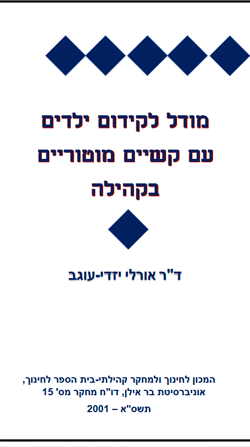
יזדי-עוגב, א. (2000). מודל לקידום ילדים עם קשיים מוטוריים בקהילה. דו"ח מחקר מס' 15
אוניברסיטת בר-אילן, ביה"ס לחינוך – המכון למחקר ולחינוך קהילתי.
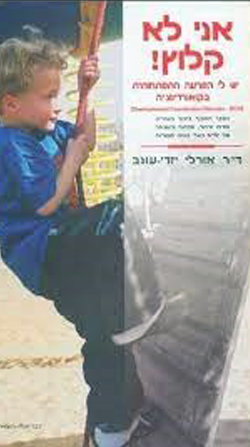
יזדי-עוגב, א. (2005). אני לא קלוץ!-יש לי הפרעה התפתחותית בקואורדינציה - ( Developmental Coordination Disorder DCD)
חדרה: 'גבריאל' הוצאה לאור. 237 עמודים.
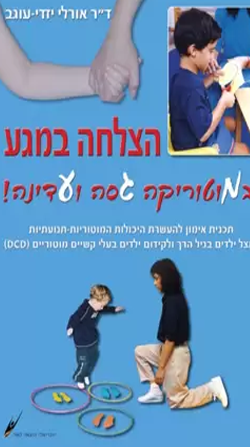
יזדי-עוגב, א. (2006). 'הצלחה במגע'-במוטוריקה גסה ועדינה!. תכנית אימון להעשרת היכולות המוטוריות-תנועתיות אצל ילדים בגיל הרך ולקידום ילדים בעלי קשיים מוטוריים (DCD)
חדרה: 'גבריאל' הוצאה לאור. 237 עמודים
פרקים בתוך ספרים שחוברו על ידי ד"ר אורלי יזדי-עוגב
יזדי-עוגב, א. (1989). שיטות תדרוך בהוראת מיומנויות מוטוריות . בתוך: הררי, י. (עורך). דרכים בהוראת החינוך הגופני-חוברת הדרכה למורה המאמן. מכללת זינמן שבמכון וינגייט.
יזדי-עוגב, א. (1996). הפרעות בקשב (הפ"ק): הבהרת הגדרות, הקשר לליקויי למידה ומאפיינים חברתיים ופסיכומוטוריים. בתוך: לידור רוני, אפרתי, נבט (עורכים). ספר המאמרים של הכינוס הבינלאומי השני, הכשרת מורים: שמרנות, התפתחות וחדשנות, מס' 2 . ישראל: משרד החינוך התרבות והספורט, גף להכשרת עובדי הוראה -מכון מופת, 635-623

